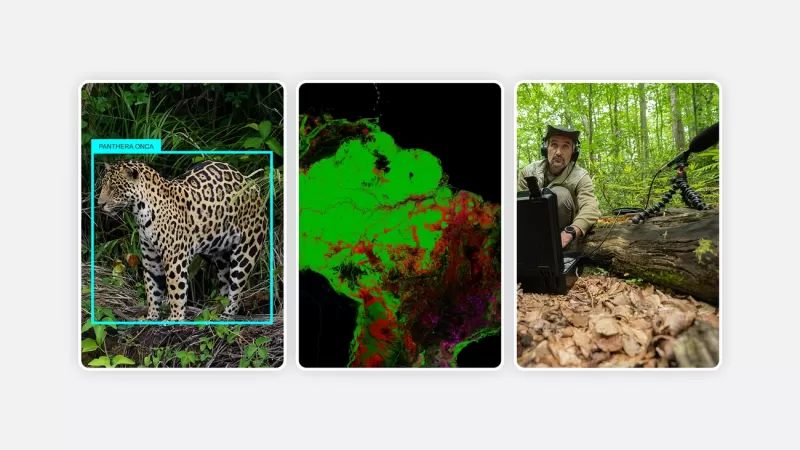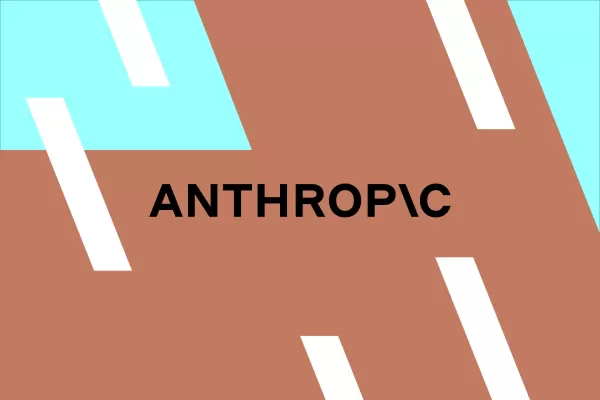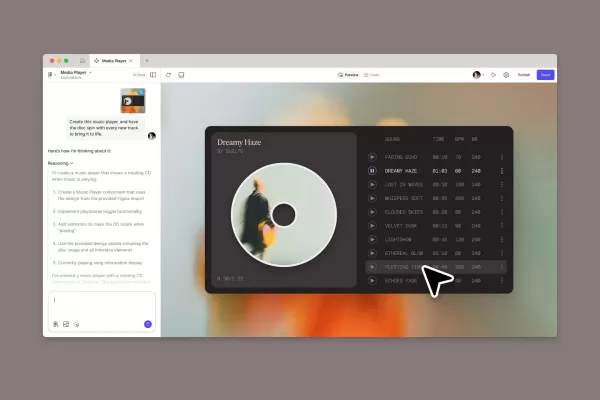AI's Role in Protecting and Restoring Nature: 3 New Approaches

Since 1970, we've witnessed a staggering 73% decline in populations of mammals, birds, fish, reptiles, and amphibians worldwide. Climate change, water stress, and resource depletion are only making things worse, putting our natural environment under even more pressure. It's pretty alarming to think that 55% of the world's GDP, which is a whopping $58 trillion, is at risk from this environmental decline if we don't act fast.
For over two decades, we've been working hard to develop tools and tech that help partners, NGOs, governments, and academics around the globe tackle nature and biodiversity loss. And now, we're excited to announce three new initiatives aimed at speeding up the protection and restoration of nature in areas with some of the most vital habitats, ecosystems, and communities.
Google for Startups Accelerator: AI for Nature
We're kicking things off with our first-ever accelerator program focused on startups that use tech to protect, manage, and restore nature. The World Economic Forum has pegged biodiversity loss and ecosystem collapse as major global risks for the next decade. To tackle this, we need better data collection, insights, and decision-making tools—which is why we're backing the world's top startups in this field. The Google for Startups Accelerator: AI for Nature is open to startups in the Americas and offers a 10-week virtual program. You'll get mentoring and technical support from Google engineers and experts through a mix of one-on-one and group sessions. Applications are open from March 3, 2025, to March 31, 2025, and the program kicks off in May 2025. Head over to our website for more info and to apply.
AI for Nature and Climate: A new grant fund for nonprofits
Google.org is putting $3M into iCS to launch an open call for grant submissions. This funding will help Brazilian nonprofit organizations and research centers use AI to come up with solutions in three key areas:
- Reversing biodiversity loss: This includes supporting the "30x30" global effort to protect 30% of the Earth's land and ocean by 2030, creating protected areas, and respecting Indigenous territories, all in line with the Global Biodiversity Framework.
- Bioeconomy: This involves tech that boosts the value chains of timber and non-timber forest products, as well as services linked to Brazilian socio-biodiversity.
- Regenerative agriculture: This focuses on activities that promote regenerative and resilient farming, especially for small farmers.
Check out this website for more details on the funding and these areas of interest.
SpeciesNet: A new open source AI model for wildlife conservation
We're also rolling out SpeciesNet, an open-source AI model that identifies animal species from camera trap photos. Since 2019, thousands of wildlife biologists have been using SpeciesNet through our Google Cloud tool, Wildlife Insights, to make biodiversity monitoring easier and inform conservation decisions. By releasing the SpeciesNet AI model, we're helping tool developers, academics, and startups focused on biodiversity to scale up their monitoring efforts in natural areas.
Protecting nature and biodiversity is crucial for fighting climate change, and we're excited to support the startups tackling this challenge head-on.
Related article
 "Dot AI Companion App Announces Closure, Discontinues Personalized Service"
Dot, an AI companion application designed to function as a personal friend and confidant, will cease operations, according to a Friday announcement from its developers. New Computer, the startup behind Dot, stated on its website that the service will
"Dot AI Companion App Announces Closure, Discontinues Personalized Service"
Dot, an AI companion application designed to function as a personal friend and confidant, will cease operations, according to a Friday announcement from its developers. New Computer, the startup behind Dot, stated on its website that the service will
 Anthropic Resolves Legal Case Over AI-Generated Book Piracy
Anthropic has reached a resolution in a significant copyright dispute with US authors, agreeing to a proposed class action settlement that avoids a potentially costly trial. The agreement, filed in court documents this Tuesday, stems from allegations
Anthropic Resolves Legal Case Over AI-Generated Book Piracy
Anthropic has reached a resolution in a significant copyright dispute with US authors, agreeing to a proposed class action settlement that avoids a potentially costly trial. The agreement, filed in court documents this Tuesday, stems from allegations
 Figma Releases AI-Powered App Builder Tool to All Users
Figma Make, the innovative prompt-to-app development platform unveiled earlier this year, has officially exited beta and rolled out to all users. This groundbreaking tool joins the ranks of AI-powered coding assistants like Google's Gemini Code Assis
Comments (51)
0/200
Figma Releases AI-Powered App Builder Tool to All Users
Figma Make, the innovative prompt-to-app development platform unveiled earlier this year, has officially exited beta and rolled out to all users. This groundbreaking tool joins the ranks of AI-powered coding assistants like Google's Gemini Code Assis
Comments (51)
0/200
![HarryGonzález]() HarryGonzález
HarryGonzález
 September 27, 2025 at 8:30:32 PM EDT
September 27, 2025 at 8:30:32 PM EDT
这篇文章让我眼前一亮 🌿 AI不仅能破坏还能修复自然?希望这三种新方法能快速落地,别再只是实验室里的概念了。人类欠大自然的债该开始还了!


 0
0
![KeithLopez]() KeithLopez
KeithLopez
 August 27, 2025 at 9:01:29 PM EDT
August 27, 2025 at 9:01:29 PM EDT
It's wild to think AI could help save nature! Those three approaches sound promising, but I wonder if they’ll really tackle the 73% wildlife drop since 1970. Tech’s cool, but can it outpace climate change? 🤔


 0
0
![WillieJackson]() WillieJackson
WillieJackson
 August 14, 2025 at 7:00:59 AM EDT
August 14, 2025 at 7:00:59 AM EDT
¡Increíble! No sabía que la IA podía ayudar tanto a la naturaleza. Esas tres nuevas ideas suenan prometedoras, pero ¿realmente podrán revertir ese 73% de pérdida? Ojalá no sea solo un parche y veamos cambios reales. 🌿


 0
0
![GregoryAllen]() GregoryAllen
GregoryAllen
 August 14, 2025 at 3:00:59 AM EDT
August 14, 2025 at 3:00:59 AM EDT
It's wild to think AI could help save nature! Those three approaches sound promising, but I wonder how fast they can scale to tackle that crazy 73% wildlife drop. Tech's cool, but nature’s clock is ticking! 🌍


 0
0
![JimmyHill]() JimmyHill
JimmyHill
 July 27, 2025 at 9:18:39 PM EDT
July 27, 2025 at 9:18:39 PM EDT
It's wild to think AI could help save nature! Those three new approaches sound promising, but I wonder how fast they can scale to tackle that 73% wildlife drop. Tech's cool, but nature’s clock is ticking. 🌍


 0
0
![FrankJohnson]() FrankJohnson
FrankJohnson
 July 27, 2025 at 9:18:39 PM EDT
July 27, 2025 at 9:18:39 PM EDT
It's wild to think AI could help save nature! Those three new approaches sound promising, but I wonder how fast they can scale to tackle that 73% wildlife drop. Gotta say, it’s a bit mind-blowing to see tech stepping up for the planet. 🌍


 0
0

Since 1970, we've witnessed a staggering 73% decline in populations of mammals, birds, fish, reptiles, and amphibians worldwide. Climate change, water stress, and resource depletion are only making things worse, putting our natural environment under even more pressure. It's pretty alarming to think that 55% of the world's GDP, which is a whopping $58 trillion, is at risk from this environmental decline if we don't act fast.
For over two decades, we've been working hard to develop tools and tech that help partners, NGOs, governments, and academics around the globe tackle nature and biodiversity loss. And now, we're excited to announce three new initiatives aimed at speeding up the protection and restoration of nature in areas with some of the most vital habitats, ecosystems, and communities.
Google for Startups Accelerator: AI for Nature
We're kicking things off with our first-ever accelerator program focused on startups that use tech to protect, manage, and restore nature. The World Economic Forum has pegged biodiversity loss and ecosystem collapse as major global risks for the next decade. To tackle this, we need better data collection, insights, and decision-making tools—which is why we're backing the world's top startups in this field. The Google for Startups Accelerator: AI for Nature is open to startups in the Americas and offers a 10-week virtual program. You'll get mentoring and technical support from Google engineers and experts through a mix of one-on-one and group sessions. Applications are open from March 3, 2025, to March 31, 2025, and the program kicks off in May 2025. Head over to our website for more info and to apply.
AI for Nature and Climate: A new grant fund for nonprofits
Google.org is putting $3M into iCS to launch an open call for grant submissions. This funding will help Brazilian nonprofit organizations and research centers use AI to come up with solutions in three key areas:
- Reversing biodiversity loss: This includes supporting the "30x30" global effort to protect 30% of the Earth's land and ocean by 2030, creating protected areas, and respecting Indigenous territories, all in line with the Global Biodiversity Framework.
- Bioeconomy: This involves tech that boosts the value chains of timber and non-timber forest products, as well as services linked to Brazilian socio-biodiversity.
- Regenerative agriculture: This focuses on activities that promote regenerative and resilient farming, especially for small farmers.
Check out this website for more details on the funding and these areas of interest.
SpeciesNet: A new open source AI model for wildlife conservation
We're also rolling out SpeciesNet, an open-source AI model that identifies animal species from camera trap photos. Since 2019, thousands of wildlife biologists have been using SpeciesNet through our Google Cloud tool, Wildlife Insights, to make biodiversity monitoring easier and inform conservation decisions. By releasing the SpeciesNet AI model, we're helping tool developers, academics, and startups focused on biodiversity to scale up their monitoring efforts in natural areas.
Protecting nature and biodiversity is crucial for fighting climate change, and we're excited to support the startups tackling this challenge head-on.
 Anthropic Resolves Legal Case Over AI-Generated Book Piracy
Anthropic has reached a resolution in a significant copyright dispute with US authors, agreeing to a proposed class action settlement that avoids a potentially costly trial. The agreement, filed in court documents this Tuesday, stems from allegations
Anthropic Resolves Legal Case Over AI-Generated Book Piracy
Anthropic has reached a resolution in a significant copyright dispute with US authors, agreeing to a proposed class action settlement that avoids a potentially costly trial. The agreement, filed in court documents this Tuesday, stems from allegations
 Figma Releases AI-Powered App Builder Tool to All Users
Figma Make, the innovative prompt-to-app development platform unveiled earlier this year, has officially exited beta and rolled out to all users. This groundbreaking tool joins the ranks of AI-powered coding assistants like Google's Gemini Code Assis
Figma Releases AI-Powered App Builder Tool to All Users
Figma Make, the innovative prompt-to-app development platform unveiled earlier this year, has officially exited beta and rolled out to all users. This groundbreaking tool joins the ranks of AI-powered coding assistants like Google's Gemini Code Assis
 September 27, 2025 at 8:30:32 PM EDT
September 27, 2025 at 8:30:32 PM EDT
这篇文章让我眼前一亮 🌿 AI不仅能破坏还能修复自然?希望这三种新方法能快速落地,别再只是实验室里的概念了。人类欠大自然的债该开始还了!


 0
0
 August 27, 2025 at 9:01:29 PM EDT
August 27, 2025 at 9:01:29 PM EDT
It's wild to think AI could help save nature! Those three approaches sound promising, but I wonder if they’ll really tackle the 73% wildlife drop since 1970. Tech’s cool, but can it outpace climate change? 🤔


 0
0
 August 14, 2025 at 7:00:59 AM EDT
August 14, 2025 at 7:00:59 AM EDT
¡Increíble! No sabía que la IA podía ayudar tanto a la naturaleza. Esas tres nuevas ideas suenan prometedoras, pero ¿realmente podrán revertir ese 73% de pérdida? Ojalá no sea solo un parche y veamos cambios reales. 🌿


 0
0
 August 14, 2025 at 3:00:59 AM EDT
August 14, 2025 at 3:00:59 AM EDT
It's wild to think AI could help save nature! Those three approaches sound promising, but I wonder how fast they can scale to tackle that crazy 73% wildlife drop. Tech's cool, but nature’s clock is ticking! 🌍


 0
0
 July 27, 2025 at 9:18:39 PM EDT
July 27, 2025 at 9:18:39 PM EDT
It's wild to think AI could help save nature! Those three new approaches sound promising, but I wonder how fast they can scale to tackle that 73% wildlife drop. Tech's cool, but nature’s clock is ticking. 🌍


 0
0
 July 27, 2025 at 9:18:39 PM EDT
July 27, 2025 at 9:18:39 PM EDT
It's wild to think AI could help save nature! Those three new approaches sound promising, but I wonder how fast they can scale to tackle that 73% wildlife drop. Gotta say, it’s a bit mind-blowing to see tech stepping up for the planet. 🌍


 0
0





























